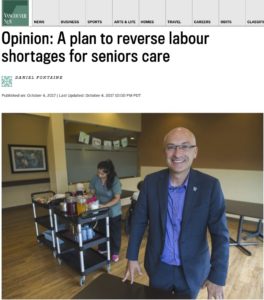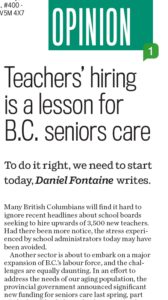By Daniel Fontaine
Many British Columbians will find it hard to ignore recent headlines about school boards seeking to hire upwards of 3,500 new teachers to meet increased requirements this fall. Had there been more notice, the stress experienced by school https://bccare.ca/wp-content/uploads/2022/08/medcare-img22.jpgistrators today may have been avoided.
Another sector is about to embark on a major expansion of B.C.’s labour force, and the challenges are equally as daunting. In an effort to address the needs of our aging population, the provincial government announced significant new funding for seniors care last spring, part of which will be dedicated to the hiring over 1,500 new staff to work in publicly funded, residential care homes over the next four years.

While this is welcome news for B.C.’s elderly citizens and those who care for them, it’s clear that without a cohesive health human-resources strategy the public may experience déjà vu as care homes struggle to meet staffing requirements.
If hiring 1,500 new staff wasn’t challenging enough, large numbers of care workers are expected to retire over the coming decade. Without a plan of action, we face the prospect of a shrinking workforce while the seniors population grows.
For B.C., labour market projections show huge demand among health occupations over the next 10 years. These jobs will be filled primarily by new entrants to the labour market, followed by migrants from outside the province and outside of Canada. Ambitious targets mandated by B.C.’s Ministry of Health for increased direct-care hours among publicly funded care-providers will be a big driver of job growth.
Within 10 years positions in health and social assistance alone are expected to generate 66,000 job openings in B.C., in part due to the aging population. By 2025, health-sector employment is projected to increase by an average rate of 2.3 per cent annually, with demand for care aides and health-care assistants ranked in the top 10.
During this time of high employment in particular, recruiting care workers has been a struggle. A 2016 survey by SafeCare B.C. found that 70 per cent of care-providers in B.C.’s non-government, residential care sector regularly operate short-staffed, with two-thirds reporting ongoing shortages of care aides. Nearly half (47 per cent) lack enough licensed practical nurses and registered nurses.
These and other statistics support calls from B.C.’s seniors care-providers to develop and implement a provincewide, continuing-care health, human-resource strategy — immediately. This is because it takes a minimum six months to train a care aide, and over a year to train a licensed practical nurse.
A made-in-B.C. health human-resource strategy for the continuing-care sector must also address the unique challenges of rural and remote regions, which face stiff competition from urban centres when it comes to recruiting and retaining workers. Then there are lesser-known factors hindering worker retention, such as the sector’s high workplace injury rate, and the prevalence of worker stress and burnout.

The B.C. Care Providers Association aims to partner with the Ministry of Health, health authorities and with labour unions to increase the chances of success of the push for more workers.
Our organization is calling for the revival of the once-successful “B.C. Cares” initiative, launched in 2008, to address the issue of displaced workers during the economic recession. This partnership between the provincial government, labour groups and other industry stakeholders ultimately encouraged thousands of candidates to seek a career in seniors care.
In hindsight, it was a mistake to wind down the B.C. Cares initiative in 2012. With today’s comparatively stronger economy, there is even more competition for a limited pool of job candidates.
But to do nothing will only exacerbate the challenge. Maintaining the status quo isn’t an option if we expect to care for B.C.’s elderly citizens.
We can avoid the pitfalls now faced by our public-school system by planning ahead. B.C. can address the worker shortfall it faces on the front lines in care homes, provided government and the continuing-care sector work together to meet the challenge head on.
Daniel Fontaine is CEO of the BC Care Providers Association. This op-ed was originally featured in the Vancouver Sun on Oct 5, 2017.
Radio interview
BCCPA VP Mike Klassen speaks with host Jody Vance on Roundhouse Radio on solutions to the care worker shortage.
https://soundcloud.com/bc-care-providers-583453035/care-worker-shortage-jody-vance-interview-with-mike-klassen





